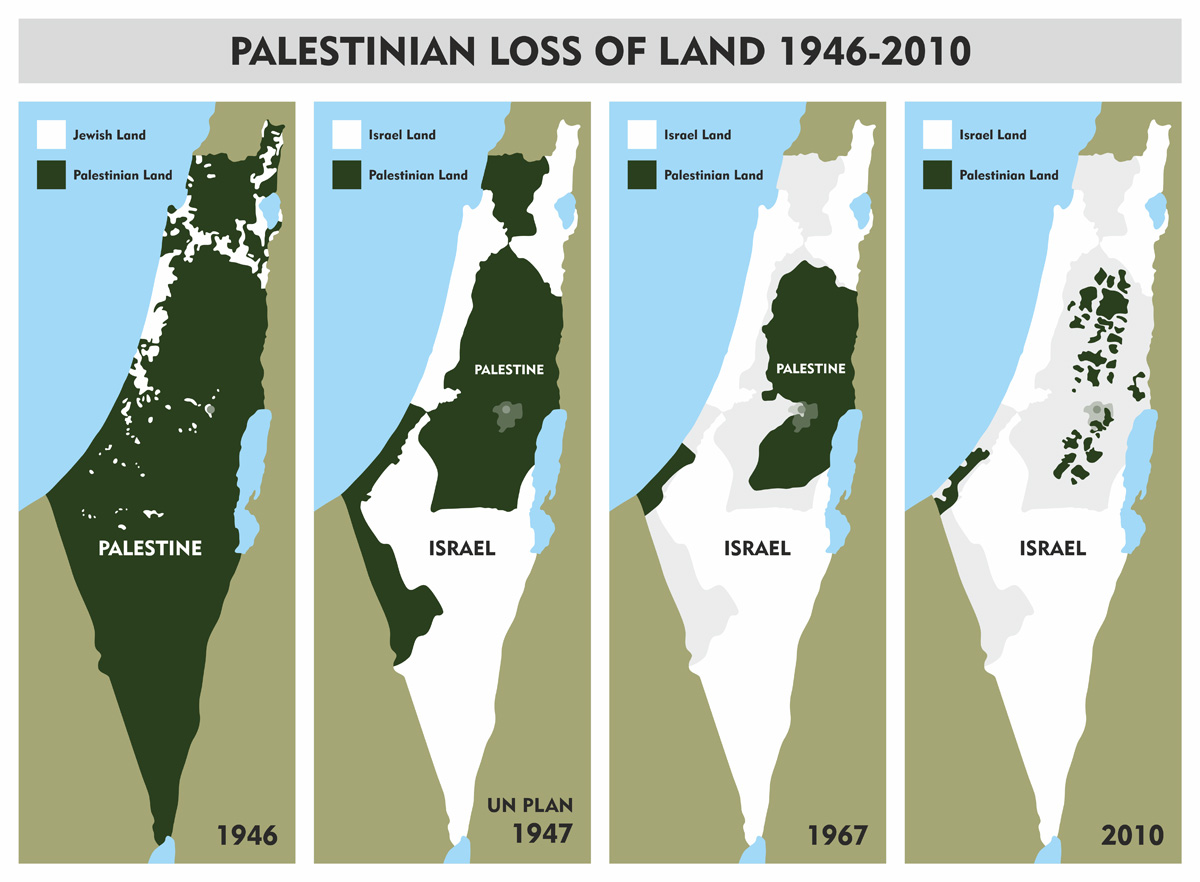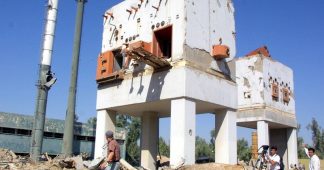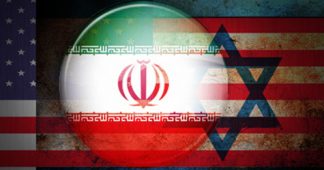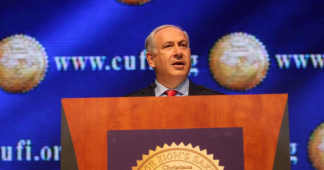I was born in Tel Aviv. I was brought up in Tel Aviv. I was a very good boy in Tel Aviv. I served in the Israeli army. I did something which is even much worse than this. I worked for four years with Shimon Peres, then leader of Israeli opposition, in the late ’70s, early ’80s before most of you were born. And it was only by the late ’80s, when I started to travel to the occupied territories quite accidentally…as a journalist, when I realized that the biggest drama of Israel is taking place half an hour away from our homes, in our dark backyard
That this real drama of Israel has almost no one to be interested in, that it is hidden in the backyard of Israel, half an hour away from our homes. All those crimes are taking place and we Israelis—most of us, if not all of us—do not want to know, do not know and above all, do not care.
And it took me many, many years to understand how come that the society—some of you met Israelis, they’re not monsters. Every catastrophe in the world, the Israelis are always the first one to send rescue teams with field hospitals. Many Israelis would help any old lady to cross the road many times, even if she doesn’t want to cross the road. People with values. How come that this society lives for so many years with this drama in its backyard and feels so good about itself and has so little moral doubt, if at all? How is it possible? How is it possible that most of the Israelis—not all of them—are deeply convinced that the IDF is the most moral army in the world? Try to tell an Israeli, and I tried it once or twice: You know what? Maybe it’s the second moral army in the world. Maybe the army of Luxembourg is more moral, I don’t know if Luxembourg has an army at all. They will be deeply offended, how can you dare? How come that when this reality is taking place so close to our homes, not over the oceans but just half an hour away from our homes, how come that we live in peace with it? That we continue with it, that there is no resistance, almost nothing? And here, I want to object to what my friend Miko [Peled] said.
When I got first the invitation to come here, the first words were “Israel Lobby,” I said, “Wow, they invited me. AIPAC has invited me.” And then I said, “That’s the chance of my life. And I’m going to come there to Washington and to tell them, ‘Listen, with friends like yours, Israel does not need enemies.’” But unfortunately…but then I continue to read and I read that I’m privileged to be invited to another forum, not exactly AIPAC, and even not the Anti-Defamation League, but I can say from here, Miko [Peled], I think that we are dealing with a corrupting friendship. I think that if it weren’t for the Israel Lobby, Israel would have been today a better place to live in. Israel would have been a more just place.
And I think that if it weren’t for the Israel Lobby, the United States would have been a better place and a more democratic place. But it’s not for me to judge the American politics. And still by the end of the day, we are dealing with an enigma, because nothing can really explain it. Nothing can explain how administration after administration, legislators after legislators, are going in the very same way which contradicts American interests in so many cases, which contradicts international law, human rights, moral values, you name it.
Can it be only this small group, as powerful as it is? Is it the full explanation? I doubt it, but that’s for you to decide, not for us in Israel. But for us is Israel—or at least for me—it is very clear. Think about a relative of yours or a friend of yours who is, God forbid, a drug addict. There are two ways to deal with him. One is to supply him with money, and he will go and buy more drugs. He will be very grateful to you. He will appreciate you. He will tell you, you love me. You are my friend. You are my best friend. The other way is to send him to a rehabilitation center. He will be so mad at you. But what is real care, and what is real love, and what is real friendship? And does anyone in this hall have the slightest doubt that Israel is occupation-addicted?
Therefore, for me, this conference here is so crucial and so important. Because we have to face reality, and reality is that there is no chance for a change from within the Israeli society—no way. I’ll try to explain why. But if this is the case, the only hope is for an international intervention, and the only hope is from this place, from Washington, from the United States, from the EU, only from there. Because the Israeli society is by far today too brainwashed; life in Israel is by far too good. And Israel, let’s face it, is a society which lives in denial, totally disconnected with reality. Would it be a private person, I would recommend either medications or hospitalization, because people who lose connection with reality might be very dangerous either to themselves or to society.
And the Israeli society lost connection with reality. It lost connection with the reality in its backyard. It totally lost connection with the international environment. Really to believe that 5 million Jews know better than 6 billion people of the world? Really believe that 5 million Jews will be able to continue to live on their sword forever? Is there one example in history in which any country lived on its sword forever—empires? Really believing that in the 21st century it is acceptable to ignore the international law in such a way as to ignore the international institutions and to rely only on the United States and Micronesia—let’s not forget this friend of Israel—and recently also, Czech Republic. Thank you, Czech Republic and Canada, your neighbor, obviously.
Does it work? Has it ever worked? So therefore, it is so crucial for people like me to see any kind of change here in the United States, and we jump on any sign. When J Street was established we said, “Yay, here it comes.” And it didn’t come. When Obama was elected, I had tears in my eyes. I said, “Here it comes.” And it didn’t come. And when I see conferences like this here today, again, it gives me some hope that change might happen, because change will have to take place here. In Israel it’s a lost case—forget about it.
The Israeli society has surrounded itself with shields, with walls, not only physical walls but also mental walls. I don’t want to get into it because it’s another lecture. But I’ll just give the three principles which enable us Israelis to live so easily with this brutal reality. A) Most of the Israelis, if not all of them, deeply believe that we are the chosen people. And if we are the chosen people, we have the right to do whatever we want. B) There were more brutal occupations in history. There were even longer occupations in history, even though the Israeli occupation gets to quite a nice record. But there was never in history an occupation in which the occupier presented himself as the victim—not only the victim, but the only victim around. This also enables any Israeli to live in peace, because we are the victims.
In the other panel, Professor Falk spoke about the dual strategy of Israel, of being a victim on one hand and manipulating on the other hand, after what happened in Paris and in Copenhagen with the terror attacks. Benjamin Netanyahu came [up] with the notion, “All the Jews must come to Israel. It’s the safest place for the Jews in the world. It’s a shelter for the Jews in the world.” Which is wrong because Israel today is the most dangerous place on earth for Jews. But let’s put it aside. It was only 24 hours later when he said Israel is in existential threat under the Iranian bomb. And I asked myself, how can you dare call Jews to come and to join this suicidal project, when the Iranians are going to bomb us?
But in Israel anything goes, and both declarations were accepted as the only truth. And here, I get to the third set of values that enable us Israelis to live in peace with the occupation. This is maybe the most crucial one and the worst one. We say victimization, we say chosen people. When I say victimization, it goes without saying, we have to mention the Holocaust and the unforgettable Mrs. Golda Meir that the American jury had exported to Israel. She said once—this unforgettable woman—that after the Holocaust the Jews have the right to do whatever they want.
But the third set of values is the most dangerous one. This is the systematic de-humanization of the Palestinians, which enables us Israelis to live in peace with everything, because if they are not human beings like us, then there is not really a question of human rights.
And if you scratch under the skin of almost every Israeli, you will find it there. Almost no one will treat the Palestinians as equal human beings like us. I once wrote that we treat the Palestinians like animals. I got so many protest letters from animal rights organizations—rightly so. But by the end of the day, how many Israelis did ever try for a moment to put themselves in the place of the Palestinians for a moment, for one day? And I want to give you two examples, which will demonstrate it.
Many years ago, I interviewed then-candidate for Prime Minister Ehud Barak. I asked him a question which I try to ask on any occasion, “Mr. Barak, what would have happened if you would have been born Palestinian?” And Barak gave me then the only honest answer he could give me. He said, “I would have joined a terror organization.” What else would he have done? Would he become a poet? He doesn’t know how to write poems. Would he become a pianist? He’s quite a bad pianist, and I doubt if he would have become a collaborator, because he is a fighter. And it became a scandal, because how can you dare to put Ehud Barak to think what would have happened if he would have become a Palestinian?
And the second incident, briefly, during the second intifada, the city of Jenin the most closed city in the West Bank, real total siege. I go out from Jenin. I come to the checkpoint. A Palestinian ambulance is parking there with the red lights. I stand after him, no cars can get out of Jenin in those days; no cars can get in. And I wait. The soldiers start playing backgammon in the tent. Usually, I know myself, it’s better that I don’t get into confrontations with the soldiers, because it always ends up very badly. So I stayed in the car. But after 40 minutes, I couldn’t take it.
I went out from the car. I went first to the Palestinian ambulance driver. I asked him, what’s going on? He told me that’s the routine, they let me wait one hour until they come and check the ambulance. And I couldn’t take it anymore. I went to the soldiers. It became a confrontation, but the question that I asked them which really brought them to direct their weapons toward me was one: what would happen if your father was lying in this ambulance? This freaked them out. They lost control. How can I dare to compare between their father and the Palestinian in the ambulance? This set of beliefs, that they are not human beings like us, enable us Israelis to live in so much peace with those crimes, ongoing crimes for so many years, without losing any kind of humanity, values I heard today.
People talk about Jewish values. I must be frank with you, I don’t know what are Jewish values. I know what are universal values. Let’s not get into it, really. There are very clear universal values. And there is a very, very clear international law, but for most of the Israelis international is very important, but not for Israel. Israel is a special case. Why is it a special case? Again, you get with all those set of values, with this living in denial.
Here, I want to get back to the topic of our panel, Is it good for Israel? No, it’s very corrupting, because as long as the United States enables Israel to continue—obviously the Palestinians are the first and direct, unbelievable victims of it—but by the end of the day, what will Israel be after all those years? What is it already today? Where does it direct to? Things are getting worse and worse, and therefore I have so little hope about change from within the Israeli society, because things, as you might know, are going more and more to the nationalistic, militaristic, religious direction, with very little hope that change will come from within.
Why would the Israeli go for a change? What incentive? Why would they bother? Life is so good. You should have seen Israel [during] the days when Gaza was bombed, when the beaches were crowded, the helicopters were passing on the way to bomb Gaza, the Israeli TV hardly showed photos from there. Newspapers hardly wrote anything. I wrote one article about the responsibility of the pilots and I needed to use bodyguards to get out of my home after this. The problem, by the way, was that the bodyguards were settlers. They argued with me all day long until I saw that I was much more secure without the bodyguards rather than with them.
This will be my final remark. The last war in Gaza taught us also that Israel has three regimes today. Maybe the only country and only state in the world with three regimes: one for the Jews, one for the Arab citizens, and one an apartheid regime in the West Bank and Gaza, one of the most brutal and cruel tyrannies in the world. But even for the façade, even for this democracy which I always thought is democracy for its Jewish citizens, I realized last summer that it is a democracy for its Jewish citizens, but only if they think like the majority.
Therefore, and with this I want to conclude, I want to tell you all that a few of us, very few, much too few, but a few of us, are looking to the West, Europe and the United States with a great hope, because we lost hope in Israel. Thank you very much.











